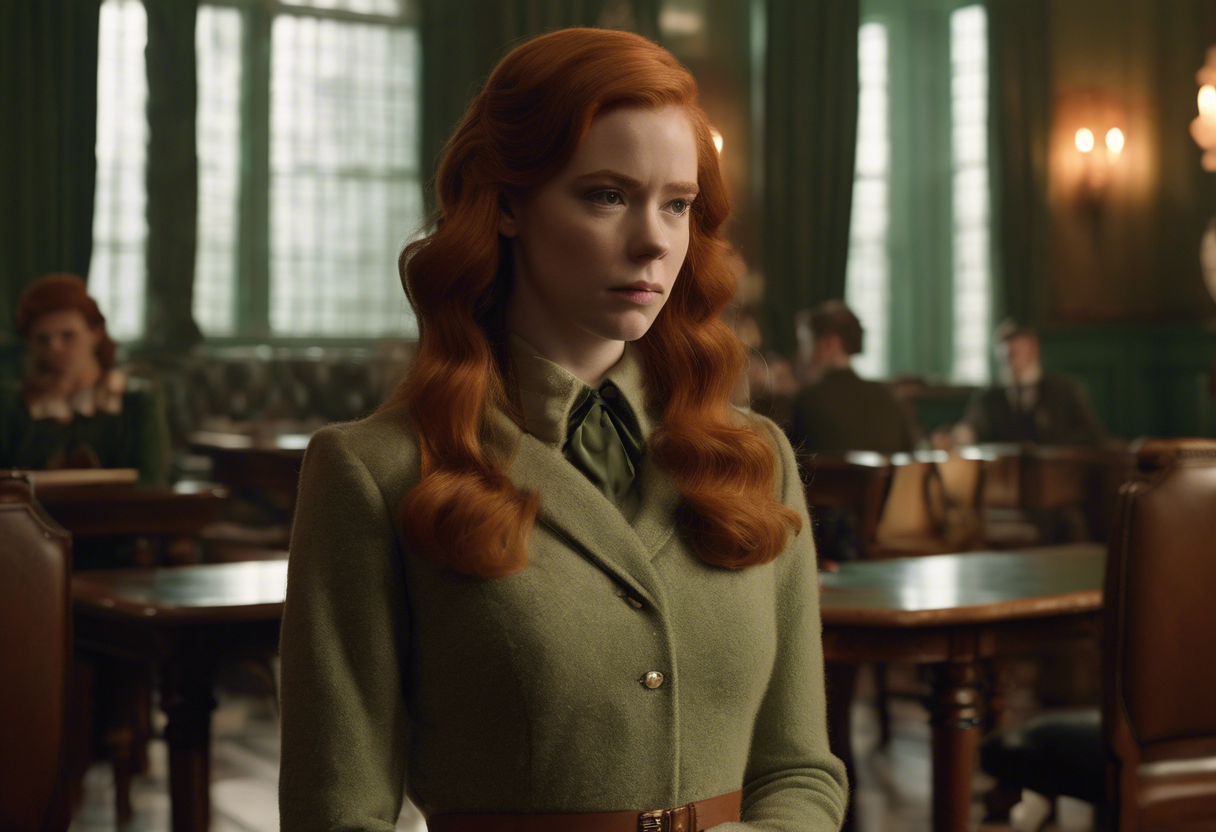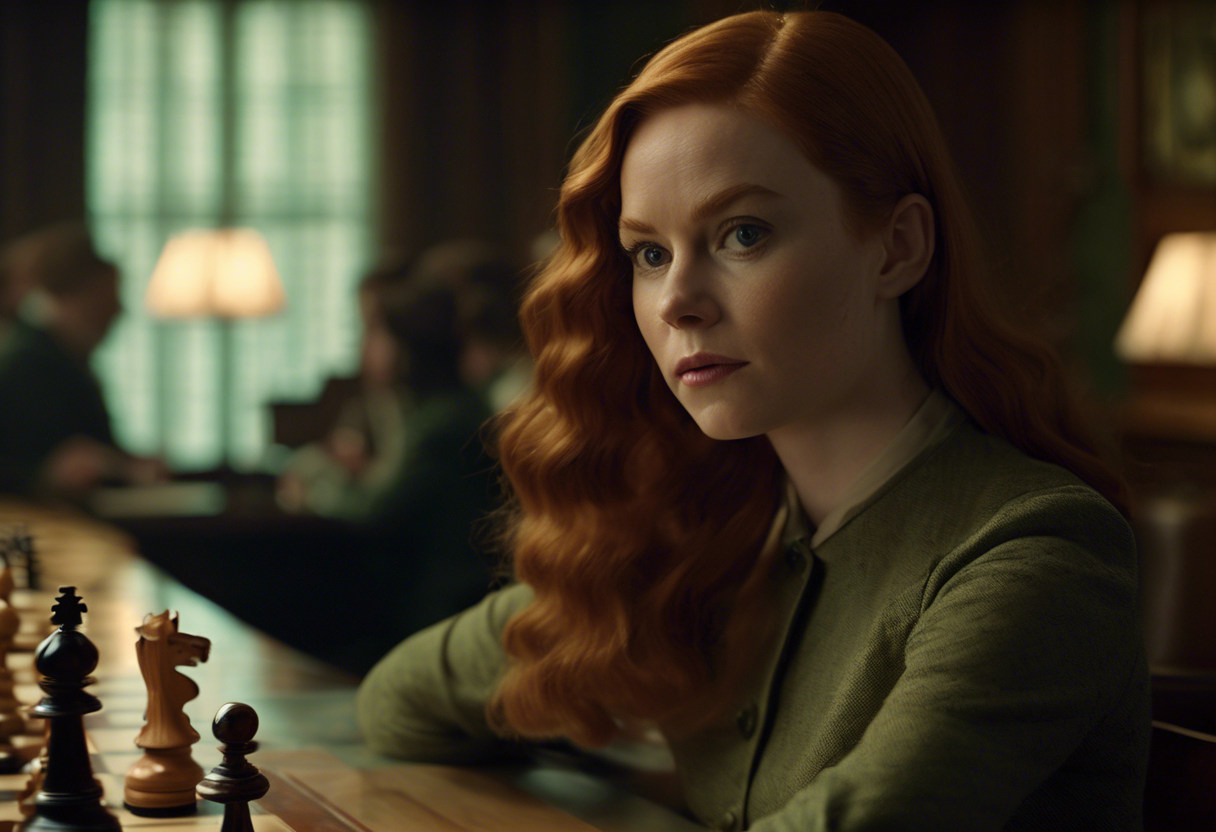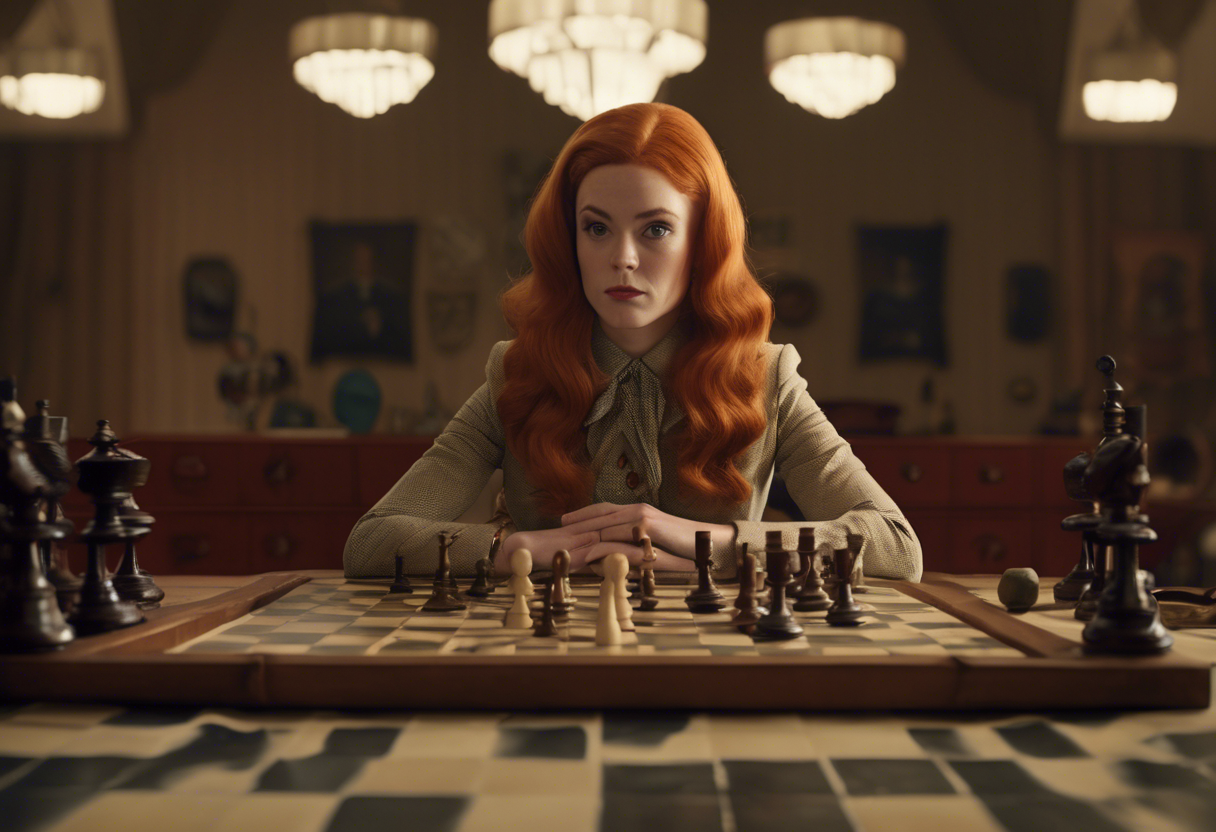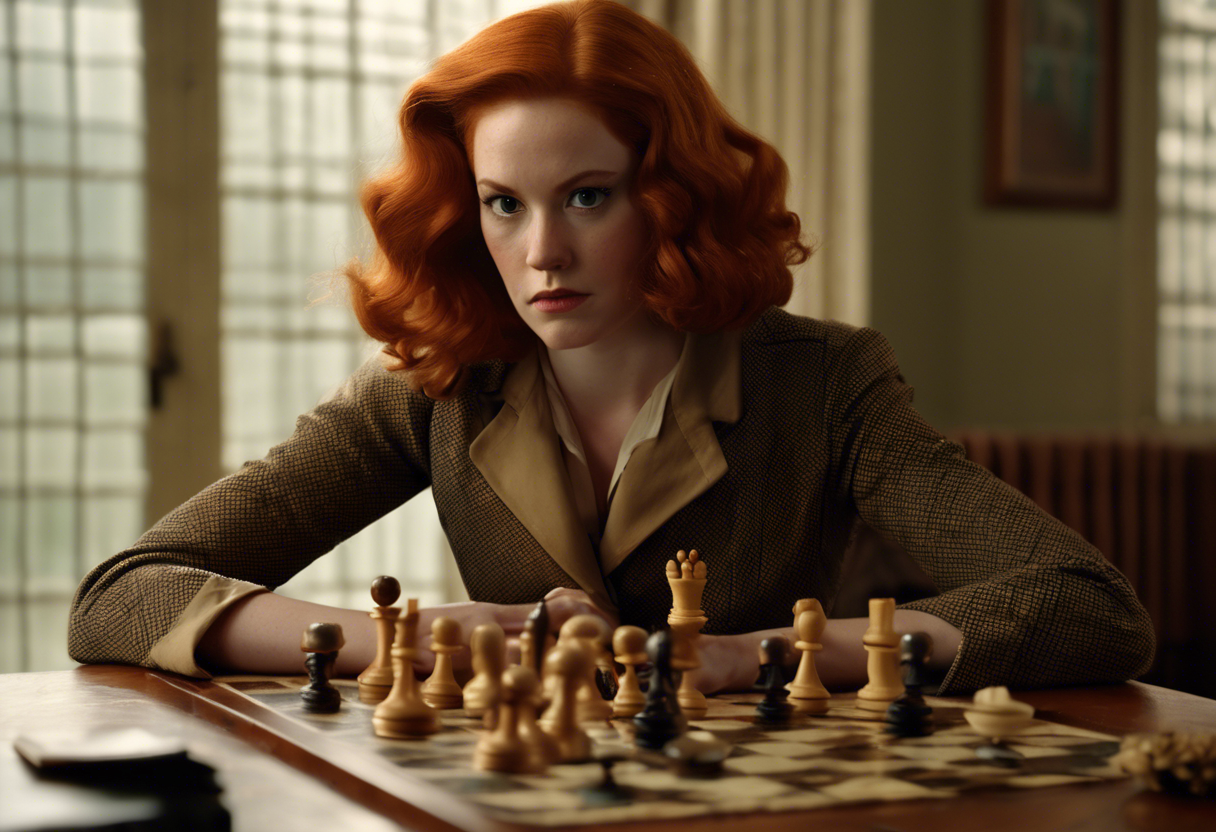The Queen’s Gambit Season 1: Episode 2 – Exchanges offers a pivotal continuation of Beth Harmon’s journey from orphan to chess prodigy, deepening her character development, exploring her emerging talents, and setting the foundation for the challenges she will face both on and off the chessboard. This episode is part of the critically acclaimed Netflix miniseries The Queen’s Gambit, created by Scott Frank and Allan Scott, and directed by Scott Frank. The series, based on Walter Tevis’s 1983 novel, has been praised for its meticulous portrayal of chess, captivating storytelling, and strong performances. The episode "Exchanges" stands out by blending the narrative of personal growth with a focused depiction of the early stages of Beth’s competitive chess career, highlighting creative choices that distinguish the show within the coming-of-age and sports drama genres.
Produced by prominent figures including Scott Frank, William Horberg, and Allan Scott, the show benefits from Frank’s direction and screenplay, skillfully combining the emotional arc of an extraordinary female protagonist with visually rich and technically accurate chess sequences. "Exchanges" furthers this by interweaving Beth’s internal world with external challenges, a narrative approach that has helped the series break conventions — especially as it centers on a female chess player in the historically male-dominated realm of competitive chess. The show’s production values, stylistic choices, and the remarkable performance of Anya Taylor-Joy contribute to the distinctive tone and immersive quality of this episode, positioning it as a key chapter in the larger story of Beth Harmon’s rise and struggles.[1][4][2]
In "Exchanges," the episode opens with Beth Harmon transitioning from her early years in the Methuen Home orphanage to her new life with her adoptive parents, the Wheatleys. The episode begins by revisiting Beth’s friendship with Jolene, her fellow orphan and close companion, as they navigate their shared past and their different futures. Jolene’s rebellious attitude and Beth’s quiet determination set the stage for intersecting lives shaped by hardship and resilience. The arrival of the Wheatleys marks a new chapter; Mrs. Wheatley is warm and welcoming, while Mr. Wheatley’s demeanor is cold and unwelcoming, creating immediate tension within the new household.
As Beth adapts to her new environment, the episode intricately depicts her early attempts to assert her identity beyond the confines of her troubled past. Early scenes focus on Beth accompanying Mrs. Wheatley on a shopping trip, where she’s introduced to the complexities of her new social class and expectations. While Beth is drawn to a chess set in the store window, Mrs. Wheatley advises her to save for it herself, introducing a subtle lesson in responsibility and self-reliance. This interaction encapsulates the transitional nature of Beth’s life — straddling the innocence of childhood and the burden of self-sufficiency.
Driven by an insatiable hunger to understand the game that had captivated her mind since her orphanage days, Beth visits the local library. Here, she immerses herself in chess literature and learns about grandmasters and competitive strategy. The librarian guides her to books detailing the achievements of chess masters, sparking an ambition that accelerates her evolution from curious player to serious competitor. Intermingled with these quiet moments are glimpses of adolescent discovery as Beth observes two students sharing a tender moment, subtly indicating her gradual entry into the complexities of social and emotional growth.[1][3]
The narrative then follows Beth’s initiative to participate in a local chess tournament. Despite her youth, lack of official rating, and gender in a largely male-dominated sport, Beth insists on playing. The tournament organizers express surprise at her arrival and question her qualifications. Beth’s determination to compete without a women’s section highlights the gender barriers she faces but also underscores her fierce independence and confidence. Her matches in the tournament form the core of the episode, unfolding as both literal and metaphorical exchanges of skill and willpower.
Beth’s first match is against a fellow female player, whom she defeats swiftly, showcasing her innate talent and tactical intuition. Her progress through the tournament is met with a mixture of skepticism and genuine admiration from opponents and spectators alike. As she advances to the second round, Beth faces a male challenger who, after a grueling game, concedes defeat, acknowledging her impressive capabilities despite his own experience. These victories solidify Beth’s growing reputation and give her a taste of competitive success, fueling her ambition further.
The tournament culminates in a tense match against Townes, a male peer whom Beth has interacted with socially throughout the day. This confrontation is not merely a game but a complex interplay of nerves, respect, and rivalry. Beth’s anxiety in this match reflects her vulnerability, yet her sharp strategic thinking places Townes in a compromised position, leading to his resignation. Townes expresses authentic admiration for Beth’s prowess, recognizing her as a formidable opponent. This victory marks a significant milestone for Beth, symbolizing her emergence as a serious contender in the chess world and reinforcing her self-belief.[1][3][2]
Alongside her burgeoning chess career, the episode poignantly captures Beth’s personal growth and challenges. She experiences her first menstrual period during the tournament, a private yet profound moment reflecting her transition into adolescence. A fellow female player gently assists her, illustrating the subtle bonds formed through shared experience. This scene humanizes Beth, positioning her not just as a chess prodigy but as a young girl navigating the complexities of growing up.
Simultaneously, the tensions within the Wheatley household intensify. The episode carefully develops the uneasy relationship between Beth and Mr. Wheatley. His coldness and eventual decision to leave the family underline the instability and emotional challenges Beth must confront outside the chess world. Mrs. Wheatley’s contrasting support offers some consolation but cannot fully shield Beth from the upheaval. These family dynamics inject a note of realism and struggle into the narrative, deepening the viewer’s investment in Beth’s resilience.[1][3]
The settings in "Exchanges" shift smoothly from the sterile and oppressive orphanage life to the more complex and sometimes alien social spaces Beth inhabits with the Wheatleys. The sterile classrooms where Beth excels academically highlight her intellectual gifts, contrasting with the social uncertainties she faces. The atmosphere of the chess tournament—filled with anticipation, subtle competitiveness, and male dominance—amplifies the stakes and the gender dynamics Beth must negotiate.
Throughout the episode, the narrative focuses on the evolving nature of exchanges—not only the literal chess moves between opponents but also the emotional and social transactions Beth experiences. The chess games serve as metaphors for larger conflicts: the negotiation between innocence and experience, isolation and connection, and the struggle to claim agency in a world that underestimates her.
The episode’s story arc weaves these individual elements—family tension, friendship, competitive growth, and personal transformation—into a compelling, cohesive narrative. It conveys not only Beth’s external victories but also her internal shifts, making "Exchanges" a crucial chapter bridging her origins and her rise in the chess world.%[1][2][3][4]%
"Exchanges" deeply explores themes of transformation, empowerment, identity, and gender dynamics. At its heart, the episode portrays Beth’s journey from a silenced orphan to a nascent chess champion, symbolizing broader themes of overcoming adversity through intelligence and determination. The motif of the chess game itself functions as a rich symbol for life’s complexities—the necessity to anticipate, strategize, and adapt under pressure. Each move on the board parallels Beth’s decisions outside it, emphasizing the interconnectedness of her mental acuity and emotional growth.
Gender is a prominent theme, as Beth confronts the systemic challenges of a male-dominated chess sphere. Her defiant participation in an unrated tournament without a women’s division challenges traditional gender roles and highlights issues of inclusivity and recognition in competitive sports. This narrative thread echoes broader conversations about women fighting for equality in professional fields typically dominated by men.
The episode also symbolizes exchanges beyond the game — including emotional exchanges in relationships, particularly the contrasting parental figures who influence Beth. Mrs. Wheatley’s nurturing care juxtaposed with Mr. Wheatley’s detachment illustrates the complex dynamics of adoption and family formation. Furthermore, Beth’s interaction with other female characters sheds light on the power of solidarity and mentorship amongst women.
Another significant theme is the coming-of-age experience, as marked by Beth’s first menstruation and awakening social awareness. This rite of passage is handled with sensitivity and realism, reflecting the broader themes of growth and change that permeate the episode.
Symbolically, the chess board represents a battleground and a microcosm of life’s challenges—a place where Beth learns discipline, control, and foresight. The recurring motif of exchanges encapsulates not only the literal moves on the chessboard but also the reciprocal nature of human relationships and competitive interplay.[1][2][3]
The cultural impact of The Queen’s Gambit, and specifically the episode "Exchanges," has been considerable. Following the series release, there was a notable surge in public interest in chess, with sales of chess sets and online chess platforms experiencing a dramatic increase, traceable in part to the compelling narrative and characters introduced early on in episodes like "Exchanges." This episode solidified Beth Harmon as an iconic figure in popular culture—a symbol of brilliance and perseverance — and has inspired references and homages in various media forms, from memes to fashion to documentaries about chess. The episode contributed to reshaping public perceptions about chess, portraying it as an accessible and thrilling intellectual pursuit rather than a niche or archaic pastime.
Viewer and community engagement with the series elevated the visibility of female competitors and inspired conversations about representation in e-sports and traditional games. The episode’s depiction of Beth playing against and defeating male opponents opened discussions on gender equity in competitive fields, resonating with audiences beyond the chess community.[1][4]
Critically, "Exchanges" received praise for its compelling narrative pacing and the depth with which it portrayed both the psychological and social aspects of its protagonist’s life. Critics highlighted Anya Taylor-Joy’s nuanced performance as Beth, capturing the complexity of a gifted yet vulnerable young girl. The episode was lauded for its authentic depiction of chess strategies woven seamlessly into the dramatic storyline, appealing not only to chess enthusiasts but also to general audiences. The careful balance between technical accuracy and emotional storytelling kept engagement high and maintained the series’ momentum.
Some critiques noted that certain passages, such as the detailed portrayal of chess moves, might be challenging for viewers unfamiliar with the game, but these generally acknowledged that the director’s visual storytelling and character focus compensated effectively. Overall, the episode was seen as elevating the series, firmly establishing the central conflicts and setting up the dramatic stakes that would unfold in subsequent episodes.[1][2][3]
The legacy of "Exchanges" lies in its foundational role within The Queen’s Gambit, serving as the bridge between origin story and rising star narrative. This episode exemplifies how character-driven storytelling and faithful chess representation can coexist to create a compelling drama. Its influence is evident in subsequent portrayals of female intellectual protagonists and has inspired creators to approach niche or specialized subjects with similar depth and care. The episode’s success helped foster interest in chess among new audiences and contributed to a broader cultural reexamination of women in competitive intellectual arenas.
"Exchanges" remains a frequently cited example of effective television writing and direction, admired for blending technical detail with emotional nuance. Its continued relevance is affirmed by ongoing discussions about The Queen’s Gambit’s impact on entertainment, gender dynamics, and chess culture, marking it as a significant episode not just within the series but in the broader media landscape.[1][4][2]
References
- https://readysteadycut.com/2020/10/23/recap-the-queens-gambit-episode-2-exchanges-netflix-limited-series/
- https://www.chessbase.in/news/The-Queens-Gambit-Episode-2-review
- https://www.screenspy.com/queens-gambit-episode-2/
- https://en.wikipedia.org/wiki/The_Queen’s_Gambit_(miniseries)
- https://www.imdb.com/title/tt10062312/







